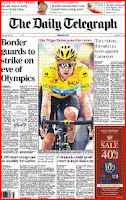Michael Wolff (top) on Rupert Murdoch resigning from the News International board, on Comment is Free: "Britain with the
Times,
Sunday Times, and
Sun in uncertain hands is a
more complicated place, Murdoch is saying. Is that what you want? At the
same time, his gesture appeases his US executives, who largely blame
James (and, by implication, Rupert's management-parenting skills) for
the London debacle – just get rid of the British business, is their
view. And maybe he will. Keeping everyone guessing about his real
intentions, even the people closest to him, is a signature tactic."
Nick Cohen in the Observer on the arrest of Sun journalist Rhodri Phillips: "Observer readers should not shudder at the suggestion that they
have anything in common with Rhodri Phillips. A threat to his freedom
is a threat to your freedom. We are all
Sun journalists now."
Tom Utley in the Daily Mail on Lord Justice Leveson: "I hope fervently that I’m misjudging him, but every day I become more convinced that he regards journalism not as a trade, as we veterans insist on calling it, but as a profession (though a less respectable one than the law). My fear is that he thinks it should be regulated as such, with the possibility that erring or unqualified journalists should be banned from practising, like disbarred barristers. Or, even worse, that a regulatory body should be controlled by Parliament. Shouldn’t that prospect fill all freedom-lovers with alarm?"
Stephen Glover in the Daily Mail:
"The idea that this Press should in any way be answerable to
politicians, as French newspapers are, offends against 300 years of
history. From the bottom of my heart, I urge Lord Justice Leveson — who
is thought to be attracted to some sort of statutory regulation of the
Press — to ponder on our hard-won tradition of free speech, and to learn
from the example of France."
The Sunday Times [£] on Guardian editor-in-chief Alan Rusbridger: "Current and former
Guardian staff argue that Rusbridger’s doctrinaire approach
to the internet — all stories are given away — has exacerbated the financial
woes. The future as envisaged by Rusbridger has yet to arrive. Digital
revenues accounted for a quarter of turnover last year but did not grow fast
enough to offset falls in the traditional print business."
David Sherbourne, the barrister representing hacking victims at the Leveson Inquiry, on ex-News of the World journalist Paul McMullan: "A parody of a tabloid journalist."
David Sherborne on the Press Complaints Commission: "Still surving, but only just breathing."
Rebekah Brooks in a statement insisting she is not guilty of charges of conspiring to hack voicemail messages: “I did not authorise, nor was I aware of, phone hacking under my editorship. I am distressed and angry that the CPS have reached this decision when they knew all the facts and were in a position to stop the case at this stage. The charge concerning Milly Dowler is particularly upsetting not only as it is untrue but also because I have spent my journalistic career campaigning for victims of crime. I will vigorously defend these allegations."
Comments on
HoldtheFrontPage on local newspaper office closures planned by Johnston Press:
Dave: "Doesn’t this put local newspapers in a rather difficult position, how, for example can they continue to campaign against police office closures, post office and bank closures in towns when they are doing exactly the same thing? "
Ex-Insider: "Sadly, Dave is spot on. When any other company quits town it’s a shock-horror story. When a newspaper does the same it’s an exciting opportunity."
[£]
Behind a paywall.
Pic of Michael Wolff :
Jon Slattery






















